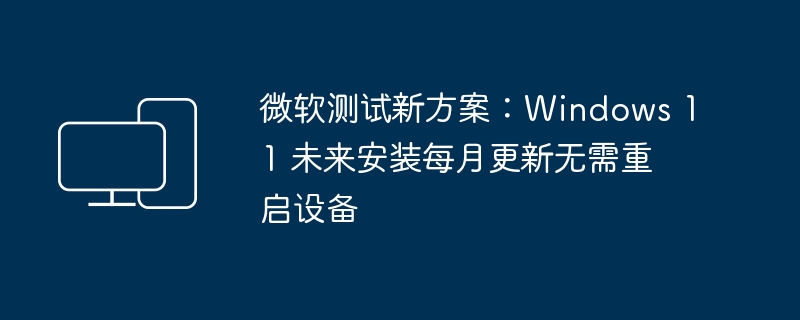Home >Computer Tutorials >Computer Knowledge >Microsoft tests new solution: Windows 11 will install monthly updates in the future without restarting the device
Microsoft tests new solution: Windows 11 will install monthly updates in the future without restarting the device
- 王林forward
- 2024-02-26 12:46:27807browse

According to foreign technology media Windows Central, Microsoft plans to introduce "hot patching" technology in Windows 11 updates. This means that after users install monthly cumulative updates, they will take effect immediately without restarting their computers. This will greatly improve the user experience and make the update process smoother and more efficient.
One of the most common complaints from Windows users is that a prompt window will pop up during system updates, asking users to install the latest security updates and restart the computer. This situation often interrupts the user's workflow or gaming experience and can be frustrating.
Microsoft plans to improve the upgrade experience by introducing "hot patches". This strategy has been implemented on some Windows Server versions and Xbox, and is now considering applying it to Windows 11 systems.
Yesterday, Microsoft released two service updates for Windows Insider project members in the Dev channel. This update does not contain any new features. The vast majority of Insider users in the Dev channel will receive the KB5036082 update, which will increase the version number to Build 26058.1300.
Insiders who have virtualization-based security (VBS) turned on will receive the KB5036080 update and may not reboot after installing the update, which will bump the version number to Build 26058.1400.
After installation on a PC with VBS turned on, the Windows build string will be updated to "ge_release_svc_hotpatch_prod1.240211-0859".
IT House quoted Microsoft’s official documentation that the working principle of “hot patch” is to “patch the memory code of the running process without restarting the process.”
Sources claim that Microsoft plans to introduce a "hot patch" feature on Windows 11 so that users can install monthly security updates without restarting the system. However, the implementation of "hot patches" requires baseline updates, which means users still need to reboot their systems every few months.
In a best-case scenario, security updates and system reboots are required only four months a year, namely January, April, July, and October. Other months will be serviced via hotfixes without requiring a system reboot.
The above is the detailed content of Microsoft tests new solution: Windows 11 will install monthly updates in the future without restarting the device. For more information, please follow other related articles on the PHP Chinese website!

